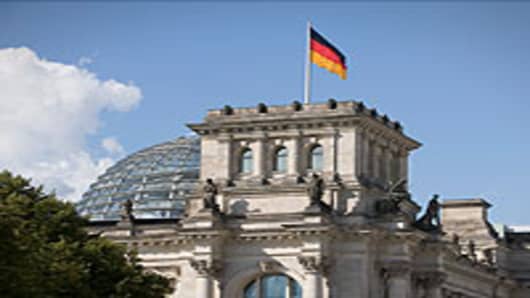Commerzbank is expected to set out plans for a multibillion-euro fundraising as early as Wednesday that will substantially reduce its dependence on German government aid.
Germany’s second-largest bank by assets needed 18.2 billion euros (almost $26 billion) of state capital to ride out the financial crisis and complete its takeover of Dresdner Bank, its troubled rival.
The money made Commerzbank Germany’s largest recipient of government capital.
Commerzbank is expected to announce plans for a placement of equity-like securities and substantial rights issue that will allow it to repay state support, which was predominantly given in the form of hybrid capital known as “silent participations”. While the bank raised about 620 million euros of equity in a share placement and debt buy-back in January, expectations that the bank would have to raise substantial amounts of equity have been a substantial drag on its shares in recent months.
Plans for Commerzbank to raise capital will also be welcomed by the government, which is under pressure to show some return for taxpayers. In total, Berlin gave almost 30 billion euros to four banks, almost none of which has yet been repaid.
The Frankfurt-based bank is expected to set out plans for a complex transaction, which will include a placing of securities to be followed by a rights issue that could raise about 10 billion euros and repay most of the 16.2 billion euros of so-called silent participation notes, according to people familiar with the situation. A silent participation is a form of debt with some characteristics of equity, which in Germany counts towards a bank’s tier one capital.
However, the fundraising plans are still fluid and could change, according to one person familiar with the matter. The fundraising is expected to be arranged by a group of banks, including Citigroup, Deutsche Bank and JPMorgan.
The government is likely to convert some of its hybrid debt into equity as part of any deal to maintain its ownership of just over 25 percent of Commerzbank’s shares.
Martin Blessing, chief executive of Commerzbank, has long promised that this would be the year that the bank started to repay its state support. He and other senior staff at the bank have had their salaries capped at 500,000 euros while the bank has not repaid state aid.
The bank also faces a burden of about 1.5 billion euros annually from this year to service the 9 percent interest rate levied by the government on its silent participations.
Commerzbank shares rose more than 3 percent on Tuesday, giving it a market capitalization of 7.5 billion euros.


